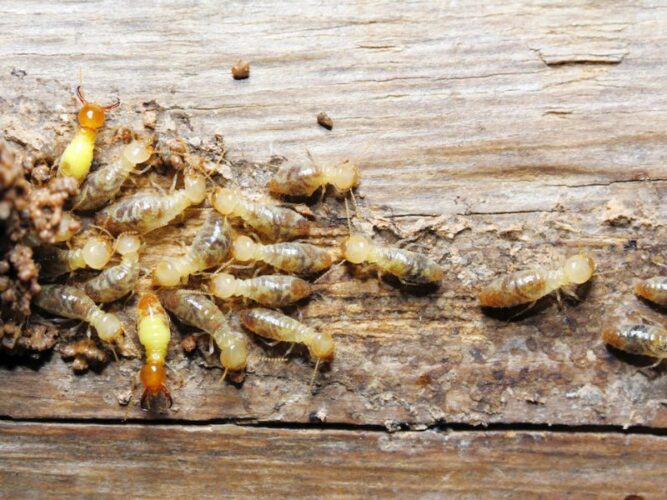Termites are one of the most destructive pests that can infest your home or property. They can cause severe structural damage to your furniture, walls, and foundations by feeding on wood and other cellulose materials. Therefore, it is important to detect and treat termite infestations as soon as possible.
Signs of termite infestation
- Some of the common signs of termite infestation are:
- Damaged wooden structures with holes or cracks
- Mud tubes or trails on the walls or foundations
- Cracks in the walls and chipping off the paint
- Blisters due to water leakage
- Swarms of winged termites or discarded wings
If you notice any of these signs, you should contact a professional pest control service for a termite inspection and treatment.
Types of Termite Treatments
There are different types of termite treatments available depending on the extent and location of the infestation, the type of termites, and the preference of the homeowner. Some of the common termite treatments are:
Treatments with liquid pesticides (termiticides) entail dousing the ground surrounding and under a building with the chemical. The termiticide forms a barrier that prevents termites from entering or leaving the building, either by killing them or scaring them away. Injecting liquid termite treatments into the wood through drilled holes is another method of reaching the termite colonies.
Termite bait stations are containers stocked with a food source (often wood or cellulose) that draws in and feeds the pests. The termites are poisoned with a bait that takes its time killing them. The termites take the bait back to the colony and feed it to each other, eventually wiping out the whole colony.
Treatment with heat kills termites by exposing them to temperatures that are too high for them to survive (often over 120 degrees Fahrenheit). Electric heaters, propane heaters, and steam generators are all viable options for applying heat treatment. If you have a small, visible infestation in a convenient location, you can kill it using heat.
The termite-killing gas (often sulfuryl fluoride) is released under a tent that covers the whole building. For pervasive infestations that are hard to reach, fumigation is a viable option. Fumigation calls for the building to be abandoned for a few days while strict safety measures are taken.
Duration of Termite Treatments
The duration of termite treatments depends on several factors, such as the type and size of the infestation, the type and amount of the treatment, the weather conditions, and the effectiveness of the treatment. However, some general estimates are:
Liquid termite treatments: These can take from a few hours to a few days to complete, depending on the size and complexity of the structure and the soil conditions. Liquid termite treatments can last from five to ten years on average12, depending on the type and concentration of the termiticide used and the environmental factors.
Termite bait stations: These can take from a few weeks to a few months to eliminate the termite colony, depending on the size and location of the colony and the feeding activity of the termites. Termite bait stations need to be monitored and maintained regularly (usually every year) to ensure their effectiveness1.
Heat treatment: This can take from a few hours to a few days to complete, depending on the size and location of the infested area and the equipment used. Heat treatment can kill termites instantly, but it does not provide any residual protection against future infestations1.
Fumigation: This can take from a few days to a few weeks to complete, depending on the size and complexity of the structure and the gas used. Fumigation can kill termites in all life stages, but it does not provide any residual protection against future infestations1.
Conclusion
Termite treatment is a necessary and effective way to protect your home or property from termite damage. However, termite treatment is not a one-time solution. It is important to conduct regular inspections, follow-up treatments, and preventive measures to ensure long-term termite control.
You should also consult a professional pest control service for advice and assistance on choosing and applying the best termite treatment for your situation.


You really make it appear really easy with your presentation but I to find this matter to be really something which I believe I would never understand. It seems too complicated and very large for me. I am taking a look forward to your next publish, I will attempt to get the hang of it!